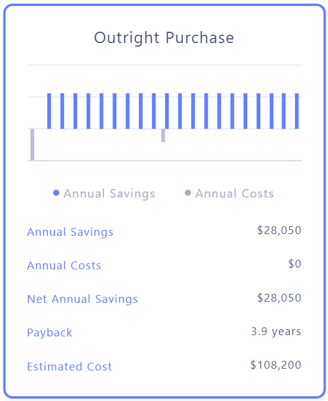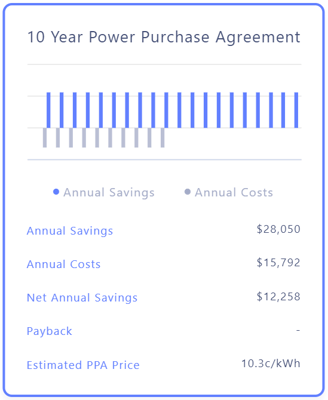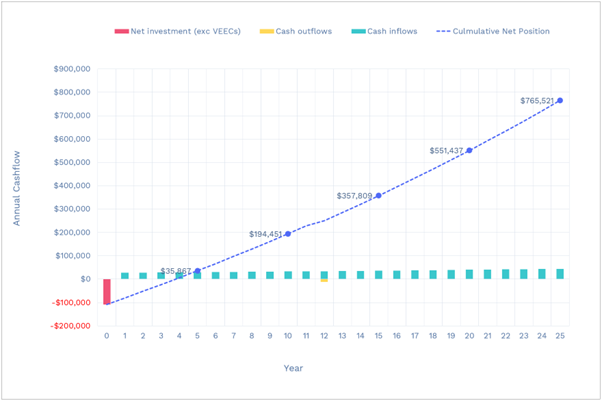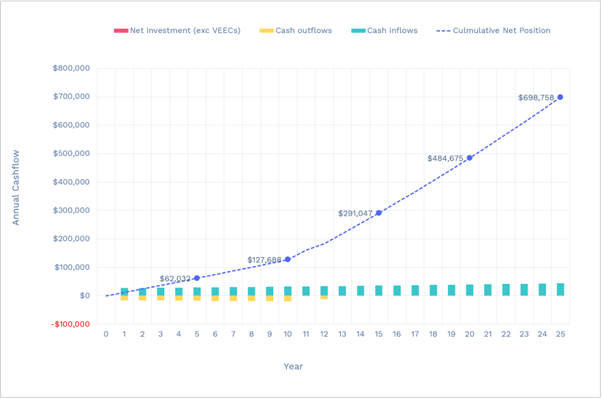What is a Power Purchase Agreement?
A Power Purchase Agreement (PPA) is a legal contract between a power generator (often a renewable energy developer) and a power purchaser (such as a utility company or a corporate entity) for the purchase of electricity.
PPA’s have become an increasingly popular pathway to securing renewable energy systems and meeting sustainability goals, as they provide long-term cashflow savings with little to no upfront cost.
Rooftop solar PPA’s often take the form of an arrangement between a customer considering the use of solar to offset their energy prices and a Solar Supplier that Installs, owns, and operates the solar system. The customer agrees to site the system on its property and purchase all the system's solar generation from the Supplier for a predetermined period and price. The term length of most PPA’s can range from 5 to 25 years, with the PPA rate changing dependent upon the term.
The purchase price of the generated electricity is typically below the retail electricity rate that the customer would otherwise pay to their retailer. The PPA rates can be fixed, or they can contain an annual price escalation agreed upon during the contract negotiation stage.
Additional savings can also be made through changes in other power characteristics, such as the decrease in KVA demand charges to the site.
Why should I consider a PPA?
There are several compelling benefits to acquiring renewable energy systems through a PPA, including lower energy costs, no upfront capital, low operating risk, carbon emissions benefits, and project cash flow positivity:
- Lower Energy Costs: PPA’s typically offers a fixed rate for the energy generated by the rooftop solar system, which is often lower than the retail energy rates charged by traditional energy providers. The fixed rate of PPA’s also remains consistent, hedging against volatility in the energy market as well as the rising cost of electricity.
- No Upfront Capital: There are little to no upfront capital costs associated with the installation and maintenance of the renewable system under a PPA.
- Low Operating risk: Since systems acquired under PPA’s are owned and operated by the solar Supplier, the responsibility for maintaining and operating the solar system is typically placed on the Supplier rather than the buyer. This means that the Supplier is responsible for ensuring that the hardware is functioning optimally, and that any maintenance or repairs are carried out as needed.
- Carbon Emissions Benefits: The implementation of a renewable energy system allows organizations to significantly reduce scope 1 and 2 carbon emissions, helping to mitigate the impacts of climate change and support a more sustainable energy future.
- Project Cashflow Positivity: As PPA’s provide a predictable and fixed rate of energy, often lower than the going retail cost of energy supplier by traditional providers, the renewable projects are often cashflow positive from day one.
Is a PPA right for me?
Whether a PPA is right for you is dependent upon on your specific circumstances, economic needs, and energy needs. PPA contracts typically last between 5 to 25 years, so it is important to be comfortable with the long-term commitment.
A PPA will often include a buyout clause, with a schedule outlining the terms and conditions related to terminating the contract early or buying out the remaining contract period. This can happen if the buyer wants to purchase the renewable energy system outright or if the buyer wants to end the contract early for other reasons.
As an example, we have examined the 25-year cashflows of a 100 kW Rooftop Solar System with an Outright Purchase option and a 10-year PPA option.


Outright Purchase

10-year PPA
